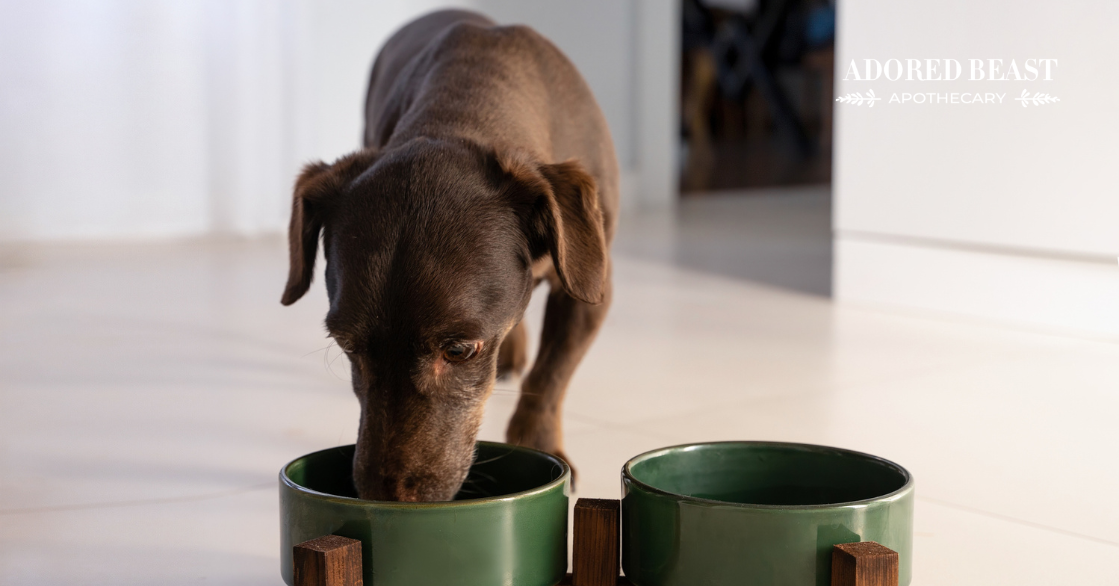When I became interested in natural health over 20 years ago, I was struck by the language being used to describe many of these practices and approaches. The terminology seemed murky and confusing, shifting depending on the writer or speaker. As I explored the various traditions and learned the appropriate terms, it was still unclear how I would describe my personal approach to health and wellness.
Eventually I settled on the term “Integrative” or sometimes “Integrated”. This term is gaining popularity in pet wellness communities.
But what does the term “integrative medicine” mean, or more specifically, “integrative medicine” for pets? This requires some unpacking, these terms have baggage! Let’s take a look.
What is Integrative Medicine for Pets?
“Integrative Medicine” has a layered meaning. At one level, “integrative medicine” is about a practitioner integrating various modalities to get the best results for patients. At another level, it is about an individual integrating various lifestyle factors and personal choices to improve wellbeing. And finally, it is about integrating the parts of ourselves, lovingly accepting the whole of who we are, as both patient and practitioner.
“Integrative medicine” is holistic.
It looks not only at a diagnosis and a set of laboratory data, but at a whole being, including mind, body, spirit, environment, and relationships. This is an almost universal part of all good veterinary medicine. Animals do not exist by themselves. They are within a system, either a family or a farm, which makes decisions for them. We must consider things such as genetics, temperament, diet, disease history, communicable disease exposure, environmental toxins, terrain, relationships, finances, stress, and even the practicality of some procedures or diagnostics.
“Integrative medicine” is inclusive.
“Integrative medicine” for pets seeks to include more options rather than fewer. Surgery and drugs are only a small part of the possible ways of addressing a goal. Some other options may include diverse modalities such as acupuncture, chiropractic, herbs, diet therapy, massage and rehabilitation, aromatherapy, behavioral modification training, homeopathy, ozone therapy, chemotherapy, radiation, stem cell therapy, photobiomodulation (laser therapy), flower essences, therapeutic touch, etc etc etc. Practitioners will often layer treatments to minimize side effects and maximize healthy benefits. So even if surgery is indicated, there may be flower essences used along with laser therapy and a special diet to support recovery.
“Integrative medicine” is individualized.
Integrative medicine seeks to create a specific individualized plan for each patient. Even if two dogs are the same breed, same age, and have the same diagnosis, their treatment plan may vary based on temperament, environment, personality, preferences, and the goals of their caregivers. While it is interesting to read about the many options possible to address a specific concern, it takes training and experience to find the right approach to each unique situation.
[RELATED] Introduction to Canine Energetics: Do You Have a Hot Dog or a Cool Cat?
Holistic, Alternative, Complementary: Are These Integrative?
Other terms that are commonly used in the health and wellness sphere, and can cause some confusion include “Complementary”, “Alternative”, “Natural”, “Holistic”, even “Functional”. Each term has a very specific meaning and history, but they are often lumped together in the minds of those looking for and giving answers to tough health questions.
“Holistic”
We discussed “Holistic” above. Holistic is the approach of looking at the whole being, including the environment and relationships. Many mainstream conventional scientific tradition practitioners are holistic, even if they do not use that term. Practitioners who consciously use the term are likely to incorporate other modalities into their practice of medicine, such as acupuncture, homeopathy, aromatherapy, alternative diets, or herbs. Additionally, they may incorporate energy modalities such as stones/crystals, reiki, etc.
“Complementary” and “Alternative”
The terms “Complementary” and “Alternative” are still used in a lot of research journals and older references, but have fallen out of favor in discussion and branding.
“Complementary” refers to modalities that are used alongside or with conventional mainstream scientific modalities. So there is a value judgement there, that the conventional therapy is primary and the other modalities are merely complementing it. Sometimes this is accurate, like using a probiotic alongside an antibiotic, to reduce the risk of GI side effects, or the use of medicinal cannabis during chemotherapy to improve appetite.
On the other hand, “Alternative” refers to the use of a modality instead of the conventional mainstream scientific therapy. This might include using an herb instead of a drug, or a change in diet instead of a drug. Sometimes there is resistance to the concept of “Alternative” because it may imply that an appropriate therapy is being rejected in favor of something “natural”. So more and more this term is being avoided, even though it is exactly what some people are looking for.
“Natural”
“Natural” is both a loaded term full of deep meaning, and also a term difficult to pin down. As a result it tends to be fairly useless as a definition. But it evokes a lot of feeling, so it is used widely in marketing.
“Natural” is “of nature,” but how do we define “nature”? All plants and animals and minerals come from nature. So while we tend to use “natural” as “safe” and “wholesome” and “real”, the truth is that poisonous substances are found in nature, or derived from it. We could define it as “not synthetic”. This may be slightly more helpful, but when applied to a supplement label or food label it still does not tell us if it works. When applied to the practice of medicine, it may mean “avoiding the use of pharmaceuticals and surgery”. However, it may include the use of synthetic vitamins, highly-processed foods and supplements, and high-energy modalities such as laser therapy, none of which are really found in nature.
“Functional Medicine”
“Functional Medicine” is a term used mostly in human medicine right now, but I expect to see it in pet health more and more. It seeks to use scientific tests to find the underlying cause of disease, then targets supplements and modalities (and sometimes drugs) to improve the function of the body. It tends to be very integrative and holistic. The focus is often on detoxification and nutrition, as well as movement/exercise and physical therapy.
Whatever terminology you are using, the goal is increasing health and wellness. Working with a knowledgeable practitioner can be priceless. But ask some questions to understand what approach that practitioner uses. What tools and modalities do they use? How were they trained? Are their goals in common with yours? Once you find a caregiver you are aligned with, whether that person practices truly “integrative medicine” for pets or not, it can be an enlightening and healing experience bringing greater wholeness to everyone involved.
Happy Healing and Green Blessings












